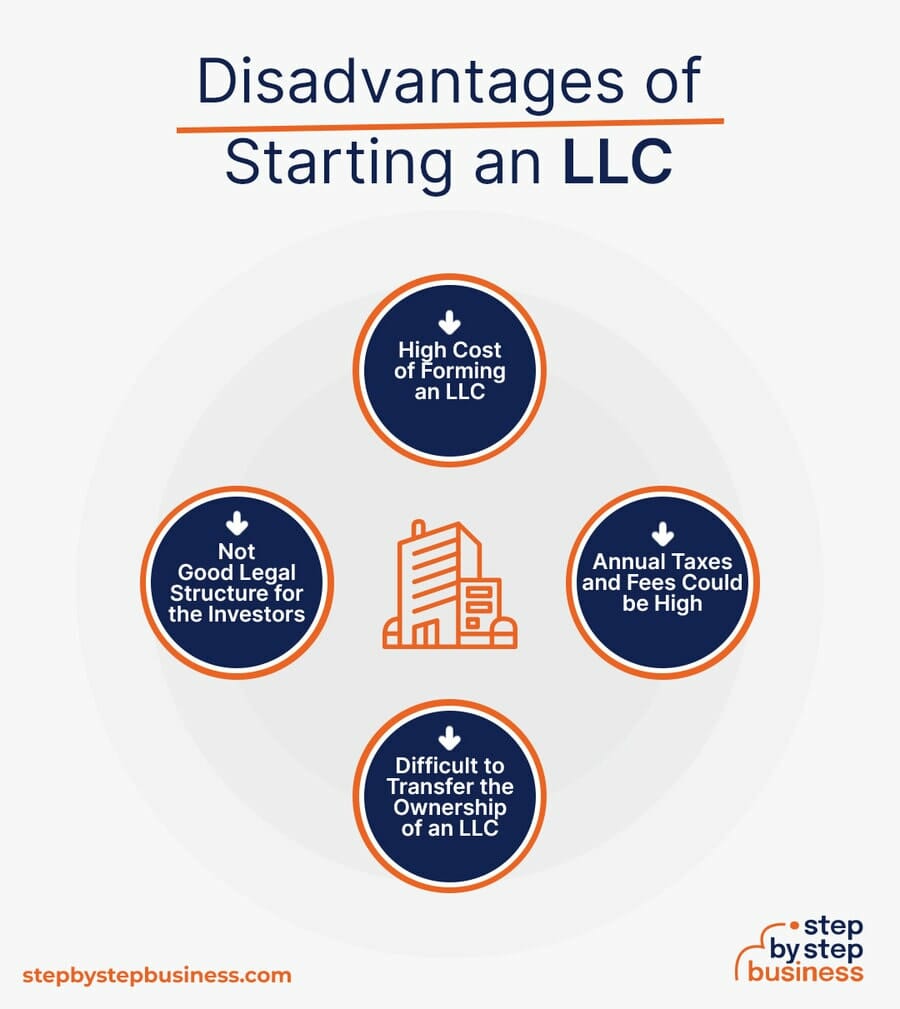When launching a business, is it really possible to get everything — from formation services to logo design — in one seamless platform? Enter ...
4 Disadvantages of Forming an LLC
Written by: Carolyn Young
Carolyn Young is a business writer who focuses on entrepreneurial concepts and the business formation. She has over 25 years of experience in business roles, and has authored several entrepreneurship textbooks.
Edited by: David Lepeska
David has been writing and learning about business, finance and globalization for a quarter-century, starting with a small New York consulting firm in the 1990s.
Published on July 2, 2022

If you’re starting a business, you may be considering forming a limited liability company (LLC). An LLC has many benefits including liability protection for ownership and greater flexibility than a corporation, particularly in terms of taxes. The LLC itself does not pay taxes. As a “pass-through” entity, income passes through the business to the owner or owners, who report it on their personal tax returns.
However, an LLC also has a few disadvantages you should be aware of before you make your decision.

1. High Cost of Forming an LLC
Forming an LLC involves a filing fee paid to the state, ranging from $40 to $500. Sole proprietorships and general partnerships don’t require registration in most states, and therefore do not have filing fees.
Additionally, in most states, LLCs are required to file an annual report which also involves a filing fee. Sole proprietorships have no such filing requirements. Some states also require LLCs to pay an annual franchise tax.
2. Annual Taxes and Fees Could be High
LLC owners, called members, are subject to self-employment taxes on the profits of the LLC. The self-employment tax rate is 15.3% as of 2022. If you instead form a corporation, you will be a shareholder of the corporation as well as an employee of the corporation, and therefore not subject to self-employment taxes.
However, LLC owners can instead choose to be taxed as a corporation. There are some situations where this can be beneficial to LLC owners because by electing to be taxed as a corporation, they avoid the self-employment taxes.
3. Difficult to Transfer the Ownership of an LLC
It is much more difficult to transfer the ownership of an LLC than a corporation. Corporations have shares that can be sold or transferred, while LLCs do not. This makes an LLC less attractive to investors since ownership cannot be easily exchanged for a capital investment. If you’re planning to try to raise money from angel investors or venture capitalists, you might want to consider forming a corporation instead.
However, if you don’t plan to raise capital for a significant amount of time, you can always dissolve your LLC and form a corporation instead at a later date.
4. Not Good Legal Structure for the Investors
Another meaningful drawback to forming a business as an LLC is it is not the optimal business structure for a company that will obtain funding from outside investors. A business owner in need of venture capital will find such lenders and investors generally only fund corporations.
Corporations are the ideal business structure for luring outside investment as the company can easily issue stock in exchange for investor funds. Though it is possible for those outside of an LLC to invest in the LLC and obtain ownership interest, doing so without a corporation will prove challenging.
Is an LLC Right for You?
An LLC is a very popular business structure for startups because, for most, the advantages generally outweigh the disadvantages. If you hope to raise capital quickly, however, you should strongly consider forming a corporation. If you envision slow and gradual growth, on the other hand, you might want to remain a sole proprietorship or partnership and avoid filing hassles altogether.
If you’re unsure, it’s highly recommended that you speak with your attorney and tax advisor to make sure you make the right decision for your company and your vision.
Subscribe to Our Newsletter
and gain insider access to cutting-edge business insights and trends.
Featured Resources

Tailor Brands Review: Features, Cost, Pros & Cons
Published on October 17, 2023
Read Now

What Is a Domestic LLC?
Published on February 14, 2023
If you’re in the process of starting a business, you may be considering forming a limited liability company (LLC). Before you do so, you shouldkno ...
Read Now

How to Open a Bank Account for an LLC
Published on February 14, 2023
When you start a business and form a limited liability company (LLC), a key step is opening a business bank account in order to separate yourpersona ...
Read Now
Comments